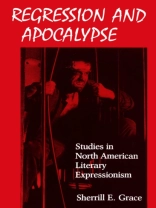Expressionism continues to fascinate scholars, and in fact has recently passed through yet another revival. From its roots in German history, aesthetics, painting, theatre, and literature, it has spread to become an international phenomenon. In this analysis of Expressionist writing by Canadian and American authors, Sherrill Grace adds important new dimension to our understanding of the works of a number of playwrights and novelists.
Working from a set of topoi and structural paradigms, Grace discusses selected examples of expressionistic texts by Eugene O »Neill, Herman Voaden, Malcolm Lowry, Ralph Ellison, Djuna Barnes, and Sheila Watson. Each of these writers was demonstrably conversatn with and influenced by German Expressionism in one or more media; taken together they suggest an alternative modernism to that of Joyce, Woolf, or Stein, and a common articulation of problems in stylistics, genre and form, and thematics.
Grace concludes by relating the expressionism of these modernists to the »neo-expressionism » of postmodernist art, pointing out a number of contemporary painters and writers who exploit the legacy of Expressionism in new ways.












